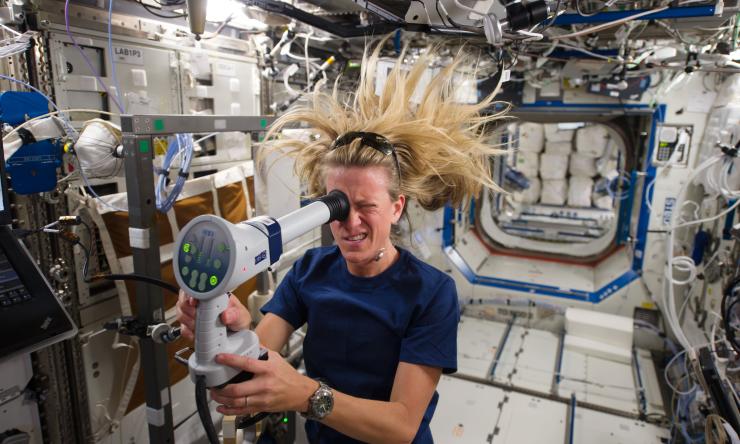TRISH seeks brain pressure measurement proposals for space
The Translational Research Institute for Space Health (TRISH), a consortium led by ˛ÝÁńÉçÇřČëżÚ with partners MIT and Caltech, is seeking scientific proposals to directly measure the intracranial pressure (ICP) of volunteer commercial space astronauts during spaceflight.
Changes to ICP in microgravity is theorized to contribute to (SANS). The collection of symptoms that make up SANS were , and the syndrome is now considered a top risk to human health and performance in space. Countermeasures will be needed as humans embark on space exploration.
“We still do not have a complete understanding of the pathogenesis of SANS,” said Dr. David Hilmers, clinical advisor at TRISH, retired NASA astronaut and professor at Baylor. “On 6-month missions to the International Space Station (ISS), in-flight procedures or devices inserted pre-launch that directly measure ICP pose risks that may be unacceptable for crew members on longer flights. Private space missions are of shorter duration, typically returning to Earth within several days. They present an opportunity to obtain this critical data with lower risk, to determine how ICP changes after exposure to microgravity, and to develop ICP measurement protocols that can be safely used during longer space missions.”
In this , TRISH is seeking solutions for real-time direct measurement of intracranial pressures of commercial astronauts. The selected awardee(s) also will propose non-invasive ways to estimate ICP. These estimations will be benchmarked against the direct ICP measurement method in space, so in the future, they can be used to estimate ICP more easily and frequently.
The selected project(s) will become part of TRISH’s EXPAND Program, the Institute’s commercial space health research program. EXPAND collects pre-, in- and post-flight health and performance data from multiple orbital and sub-orbital commercial spaceflights. The data is housed in a centralized research database and biorepository at Baylor and is set to open to researchers with hypothesis-driven questions in late 2025.
While TRISH is a NASA-funded research institute, a private philanthropic gift to the BCM Center for Space Medicine is helping to support this research opportunity.
“TRISH is unique in that it leverages opportunities and best practices from the private, public and academic space health sectors. We hope to make significant advances in finding the cause for SANS,” said Dr. Rihana Bokhari, scientific research director at TRISH and assistant professor at Baylor. “With this study, we can get critical information to protect our astronauts from potentially dangerous changes to the brain and eyes in space. These changes are expected to worsen the longer you are in space, particularly over a long-duration mission to Mars.”
The deadline to submit proposals for this solicitation is 11:59 p.m. ET on May 15. Proposers may also attend a at 2 p.m. ET on April 10. A recording of the briefing will be made available alongside the solicitation on .
TRISH (Translational Research Institute for Space Health) is a lean institute empowered by NASA’s Human Research Program to help shape the future of human performance by rapidly ensuring astronauts and earthlings benefit from the latest space health advancements.



 Credit
Credit
